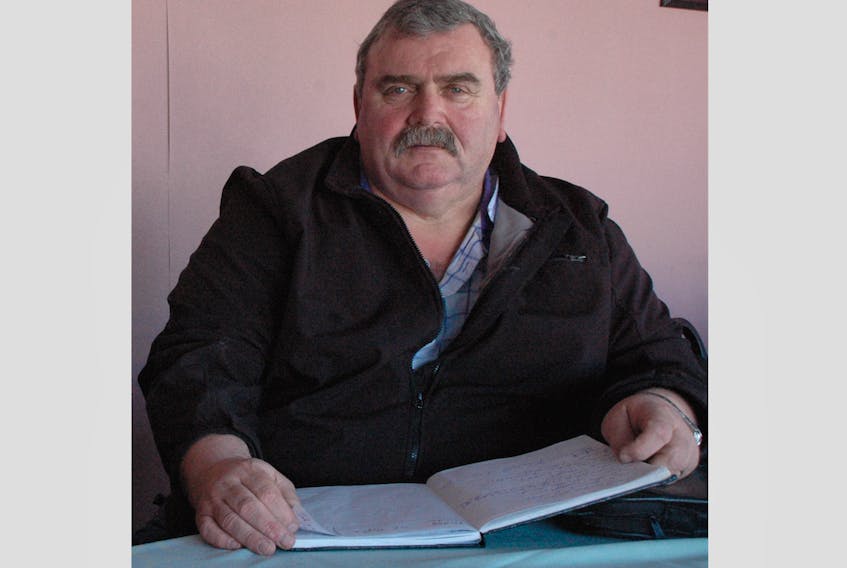ST. ANTHONY, NL – North of Fifty Thirty Association co-ordinator Jerome Ward says a serious cut in cod quota is needed to protect the fishery and the livelihood of rural Newfoundland and Labrador, but that it needs to be borne by all harvesters, not just those plying inshore waters.
Ward expressed his agreement towards the call for a 38 per cent reduction in season length by the Food, Fish and Allied Workers (FFAW) Union and the Newfoundland and Labrador Groundfish Industry Development Council.
“I support that 100 per cent,” said Ward. “If we don’t take a big cut, you might as well look at the rural part of this province and say we’re finished.”
The Groundfish Enterprise Allocation Committee (GEAC) called for an even stronger cut of 50 per cent to the cod fishery. In the GEAC’s press release following their meetings with the Department of Fisheries and Oceans (DFO), executive director Kris Vascotto says it is not only disappointing to see a 30 per cent decline in northern cod’s biomass, but also that they feel the FFAW is ignoring the warning signs and scientific advice that cod quotas should be kept at their lowest possible level.
At the March 23 briefing in St. John’s, DFO explained a key reason for the decline in cod stocks, which were originally projected to double by 2020, is the cod’s natural mortality.
Ward attended a recent meeting in St. John’s regarding the decline in cod biomass, and says one of his major issues from that meeting was a lack of context as to what the cod’s natural mortality rate means.
“If the scientists are so adamant that it’s the natural mortality that is the problem, they need to back it up and give us more information as to what that really means,” Ward said. “Are they scared to use the word ‘seal’? Are we on the critical list to cod recovery because the seals are so dominant?”
There are several other factors that Ward feels should be addressed in future discussions surrounding the state of cod. He says factory-freezer trawlers that scrape the ocean floor, some of which may be prime spawning grounds for cod, is one factor that could be having a major impact on cod stocks. An industry spokesperson says that fleet, greater-than-100-foot, has not fished cod since the moratorium was introduced.
Ward says the effects of expanding the province’s offshore oil industry could take a hit on the cod population, as well.
“This is a serious problem, so we need to know what this natural mortality is really all about,” said Ward.
The future of the cod fishery is an issue that hits home for Ward, particularly as he is reminded of his own experiences during the lead up to the moratorium of 1992.
“I experienced it in the fall of 1991,” said Ward. “They came out saying ‘there’s cod out there, don’t worry. The signs show there could be a million tons of fish out there.’ And we went out that year and couldn’t find one. Then the following summer the moratorium came and everything was shut down.
“So where is my faith in science? My faith is still pretty weak in science.”
Ward says it is crucial that science is used to better manage the fishery and ensure it is sustainable, but the people and communities that are most affected by the fishery need to be given equal consideration.
“On the other side of science is people and community, and if they go ahead with the reduction that they’re talking about, we’re not going to survive,” he said.
GEAC’s Vascotto says that the past increases in cod quota and extended seasons were too aggressive, and he hopes the recent findings on a depleting biomass will encourage a 50 per cent cut in cod catch this year. His thinking is that a cut now will mean a better chance of a future for the fishery for coming generations.
While Ward agrees a serious cut is necessary, he hopes the survival of the rural outports of the province will be taken into consideration and it will not solely be the inshore fishery that suffers the consequences.
“If we’re going to further separate resources from our communities, then it’s going to further kill our communities,” said Ward. “So isn’t it time that somebody in the offshore took a kick over this?”
NOTE: An earlier version of this story stated that Jerome Ward was in favour of the 50 per cent cut called for by the Groundfish Enterprise Allocation Committee. There was a misunderstanding in the initial interview and the story has been reedited for correction and clarification.
[email protected]









